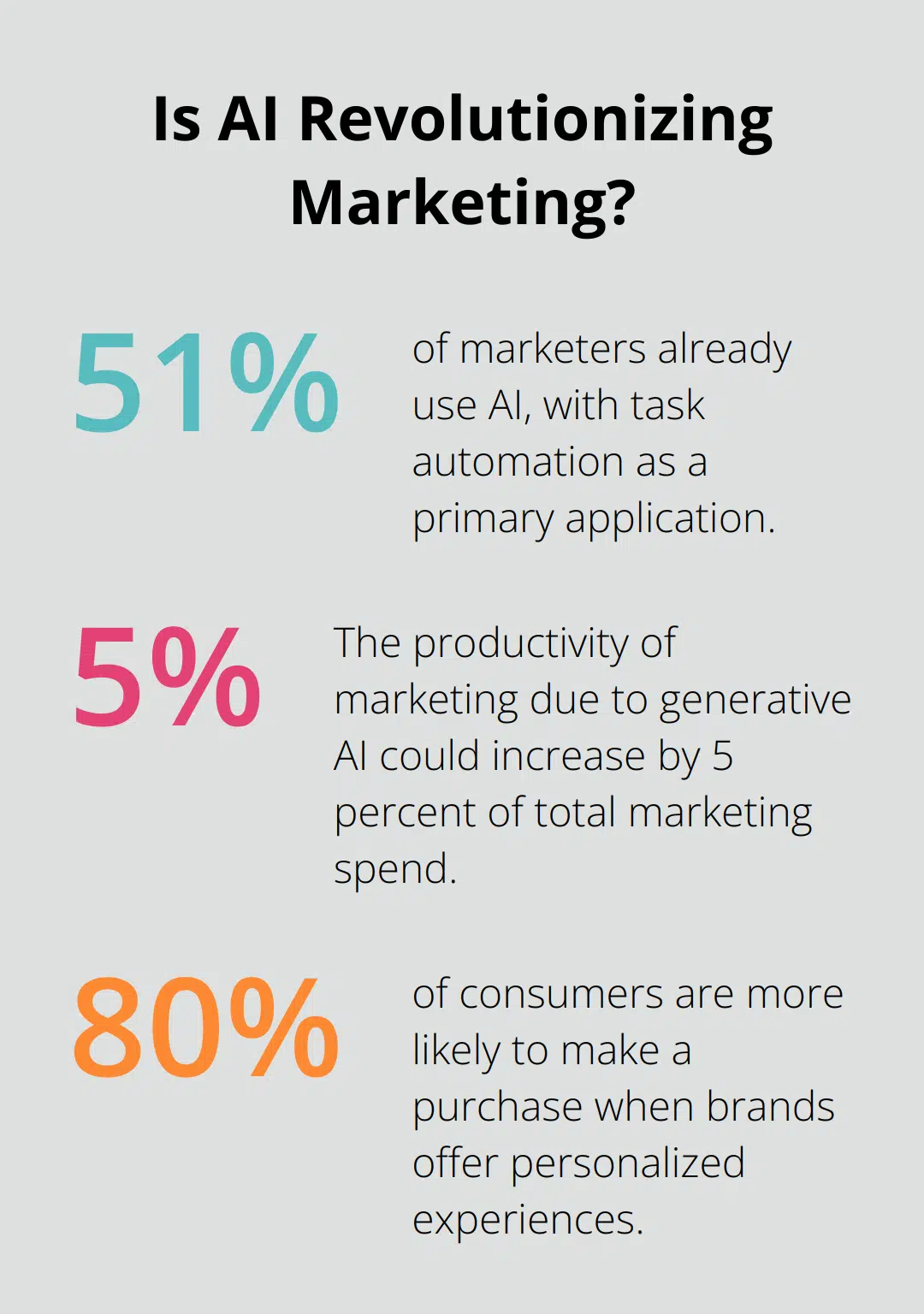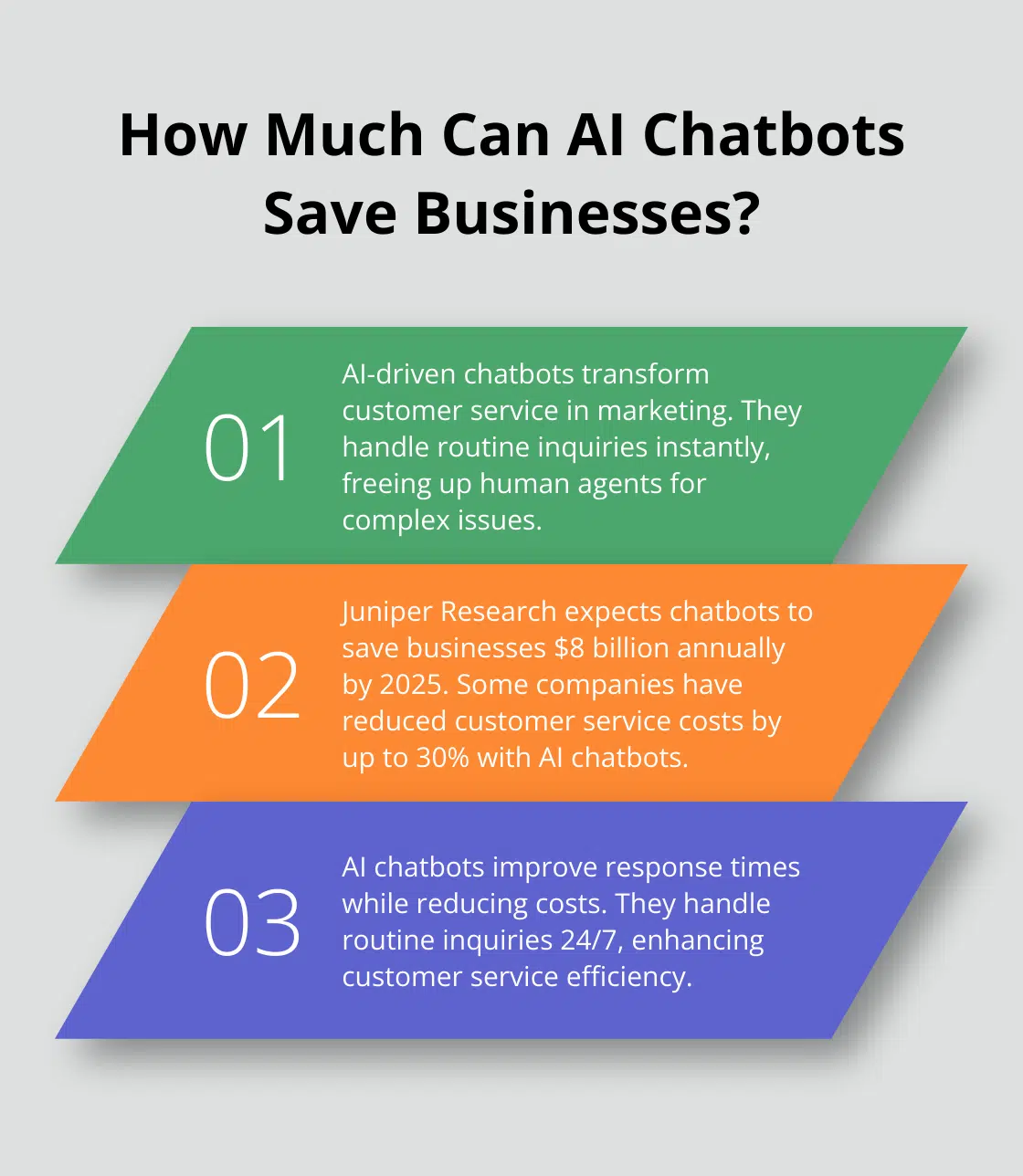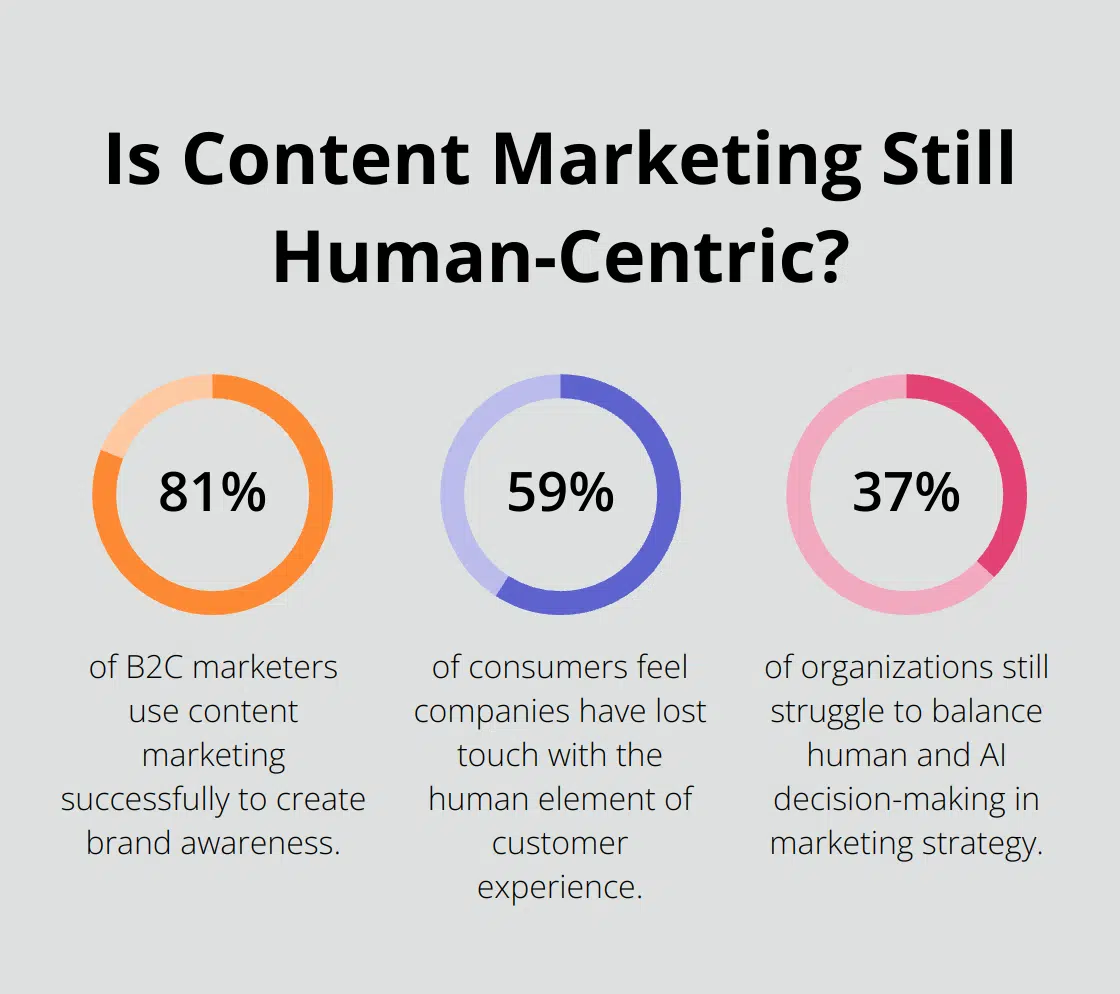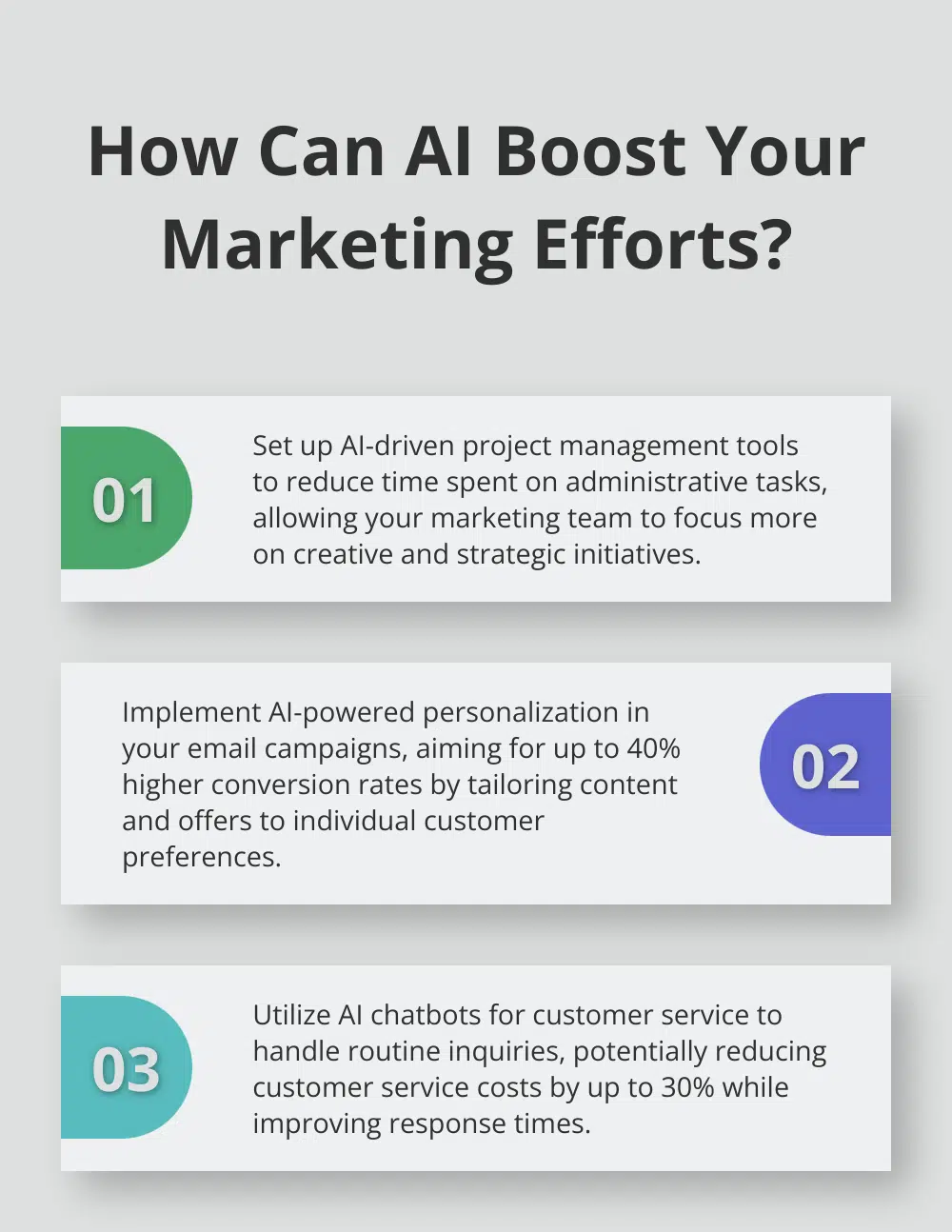AI marketing is reshaping the landscape of digital promotion, leaving many to wonder about the future of human marketers.
At Made Simpler, we’ve seen firsthand how AI tools are transforming marketing strategies and workflows.
This blog post explores the impact of AI on marketing teams, highlighting areas where machines excel and where human skills remain irreplaceable.
How AI Transforms Marketing Teams
AI revolutionizes marketing teams, reshaping how they operate and deliver results. This transformation impacts various aspects of marketing, from task automation to data analysis and personalization.
AI Automation Streamlines Workflows
AI significantly impacts marketing teams by automating time-consuming tasks. Social media scheduling tools powered by AI analyze optimal posting times and distribute content automatically. This automation allows marketers to concentrate on strategy. A Salesforce report indicates that 51% of marketers already use AI, with task automation as a primary application.

Teams that use AI-driven project management tools can reduce time spent on administrative tasks significantly. This efficiency boost enables marketers to allocate more time to creative and strategic initiatives that drive business growth.
AI Enhances Data Analysis for Informed Decisions
AI processes vast amounts of data quickly and accurately, transforming how marketing teams analyze performance and make decisions. Machine learning algorithms identify patterns and insights that humans might overlook, leading to more informed strategies.
AI-driven CLV models can optimize promotional strategies by predicting which offers are most likely to resonate with customers. A McKinsey study found that the productivity of marketing due to generative AI could increase between 5 and 15 percent of total marketing spend, worth about $463 billion. This level of insight enables teams to allocate budgets more effectively and target high-value customers precisely.
AI Enables Hyper-Personalization at Scale
AI empowers marketing teams to deliver personalized experiences to customers at an unprecedented scale. Through advanced segmentation and real-time data processing, AI systems tailor content, product recommendations, and offers to individual preferences.
An Epsilon report revealed that 80% of consumers are more likely to make a purchase when brands offer personalized experiences. Some companies have achieved up to 40% higher conversion rates when implementing AI-driven personalization in their email campaigns.
AI Augments Creative Processes
While AI excels at data-driven tasks, it also enhances creative processes. AI-powered tools can generate content ideas, suggest headlines, and even create rough drafts (though human refinement remains essential). This collaboration between AI and human creativity leads to more innovative and effective marketing campaigns.
AI Optimizes Ad Spend and Targeting
AI algorithms optimize ad spend by analyzing vast amounts of data to identify the most effective channels, audiences, and ad formats. This optimization leads to higher ROI on advertising budgets. For instance, programmatic advertising (powered by AI) allows for real-time bidding and placement of ads, ensuring maximum impact and efficiency.
As AI continues to evolve, marketing professionals who embrace these technologies will find themselves at the forefront of innovation. The next section will explore specific areas where AI excels in marketing, showcasing its potential to revolutionize various aspects of the field.
AI’s Marketing Superpowers
AI has revolutionized marketing, excelling in areas that were once time-consuming and complex for human marketers. This technology enhances marketing efforts across various domains, transforming how businesses approach their strategies.
Content Creation at Scale
AI-powered tools now generate blog posts, social media content, and even video scripts at an unprecedented pace. This article delves into how e-commerce stores can leverage the latest AI technology, including GPT-3 and beyond, to automate large-scale content production. Human oversight remains crucial for maintaining brand voice and ensuring accuracy.
Predictive Analytics for Smarter Decisions
AI algorithms analyze vast datasets to forecast future trends and customer behaviors. Generative AI trends are expected to reshape every knowledge-fueled task and role, reconstruct knowledge practices and resources across every industry. These insights allow marketers to allocate resources more effectively and tailor campaigns for maximum impact.
24/7 Customer Service with Chatbots
AI-driven chatbots have transformed customer service in marketing. They handle routine inquiries instantly, freeing up human agents for complex issues. Juniper Research expects chatbots to save businesses $8 billion annually by 2025. Some companies have reduced customer service costs by up to 30% with AI chatbots while improving response times.
Precision in Programmatic Advertising
AI excels in programmatic advertising, optimizing ad placements in real-time across multiple channels. eMarketer revealed that 86.5% of digital display ads in the US were bought programmatically in 2021, demonstrating the dominance of AI in this space. This precision targeting leads to higher conversion rates and better ROI for marketing budgets.
Data-Driven Personalization
AI enables marketers to deliver highly personalized experiences at scale. Machine learning algorithms analyze user behavior, preferences, and historical data to create tailored content and product recommendations. This level of personalization (which would be impossible to achieve manually) significantly improves customer engagement and conversion rates.

While AI’s capabilities in these areas are impressive, human creativity and strategic thinking remain essential in marketing. The next section will explore the irreplaceable human elements that complement AI’s analytical power.
The Irreplaceable Human Element in Marketing
The Art of Brand Storytelling
AI generates content, but human marketers craft compelling brand narratives. They bring unique perspectives, cultural understanding, and emotional depth to storytelling that AI cannot replicate. A Content Marketing Institute study found that 81% of B2C marketers use content marketing successfully to create brand awareness (a task that demands human creativity and strategic thinking).
Emotional Intelligence in Customer Interactions
Human marketers read between the lines and understand nuanced customer emotions. This skill proves essential for crisis management, handling sensitive issues, and building brand loyalty. A PwC survey revealed that 59% of consumers feel companies have lost touch with the human element of customer experience (highlighting the ongoing need for human empathy in marketing).
Strategic Decision-Making in Complex Scenarios
AI excels at data analysis, but human marketers interpret that data within broader business contexts. They consider factors like market trends, competitive landscapes, and long-term brand goals that AI might overlook. A Gartner study showed that 37% of organizations still struggle to balance human and AI decision-making (underscoring the importance of human judgment in marketing strategy).
Creative Problem-Solving
Marketers face unique challenges that require innovative solutions. Human creativity allows for out-of-the-box thinking and the ability to connect seemingly unrelated ideas. This creative problem-solving often leads to breakthrough campaigns and strategies that AI alone cannot conceive.
Building Authentic Relationships
Human marketers excel at building genuine connections with clients, partners, and customers. They understand the nuances of interpersonal communication and can adapt their approach based on subtle cues. These authentic relationships often lead to long-term partnerships and customer loyalty that AI-driven interactions struggle to achieve.

Final Thoughts
AI marketing has transformed digital promotion, automating tasks and enabling personalization at scale. However, human marketers remain essential for creative strategy, emotional intelligence, and complex decision-making. The future of marketing lies in the collaboration between AI and human expertise, leading to more effective and innovative campaigns.

Marketing professionals should embrace AI as a powerful ally rather than view it as a threat. By developing skills that complement AI capabilities, marketers can position themselves as invaluable assets in the AI-driven landscape. Those who adapt and learn to work alongside AI will thrive in this new era of marketing.
At Made Simpler, we harness the power of AI to elevate our clients’ marketing strategies. Our AI-enhanced solutions, combined with human expertise, deliver high-quality marketing assets that drive significant returns on investment. The future of marketing is not about humans versus machines, but about humans and machines working together to create impactful, data-driven campaigns.

